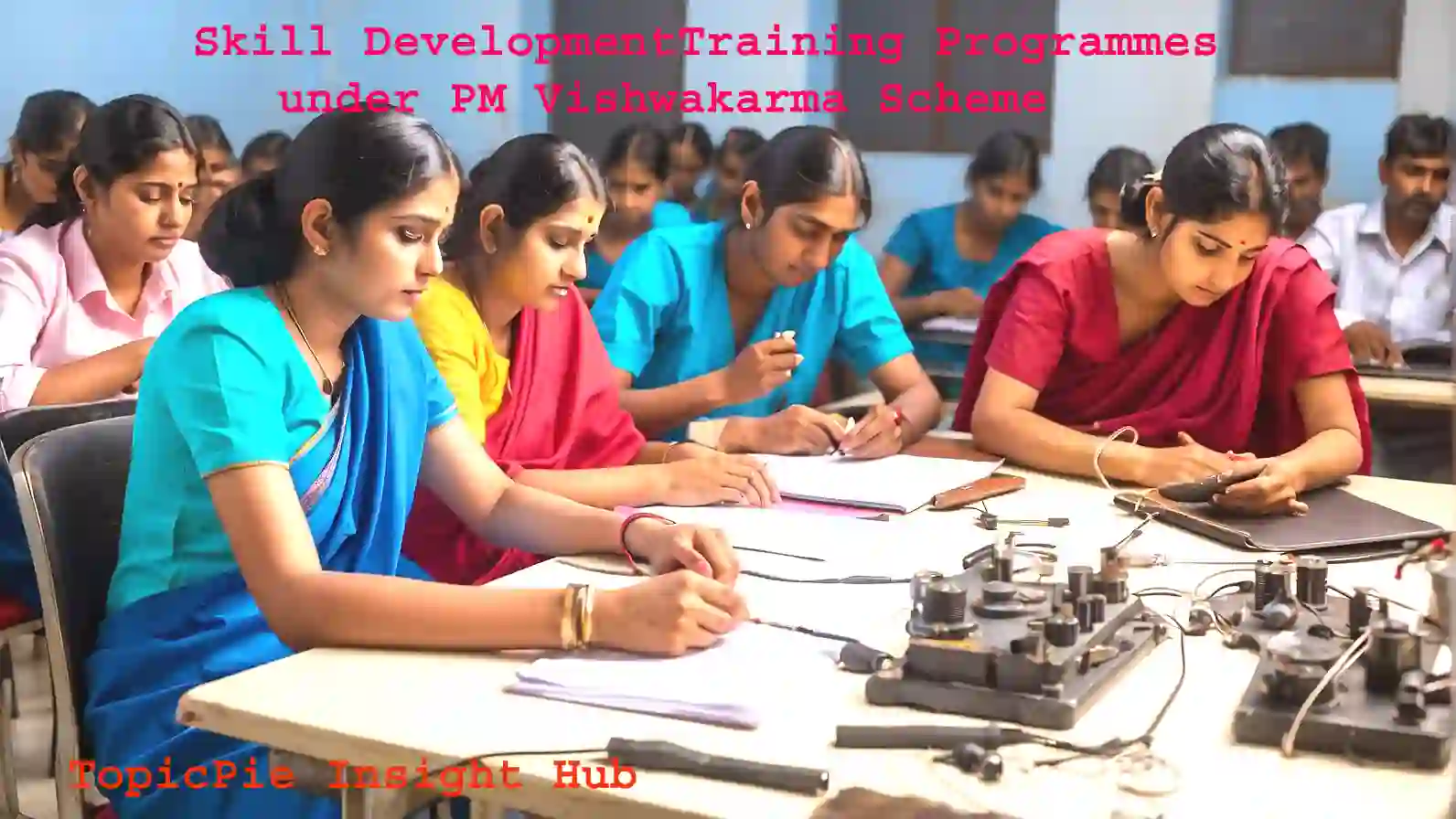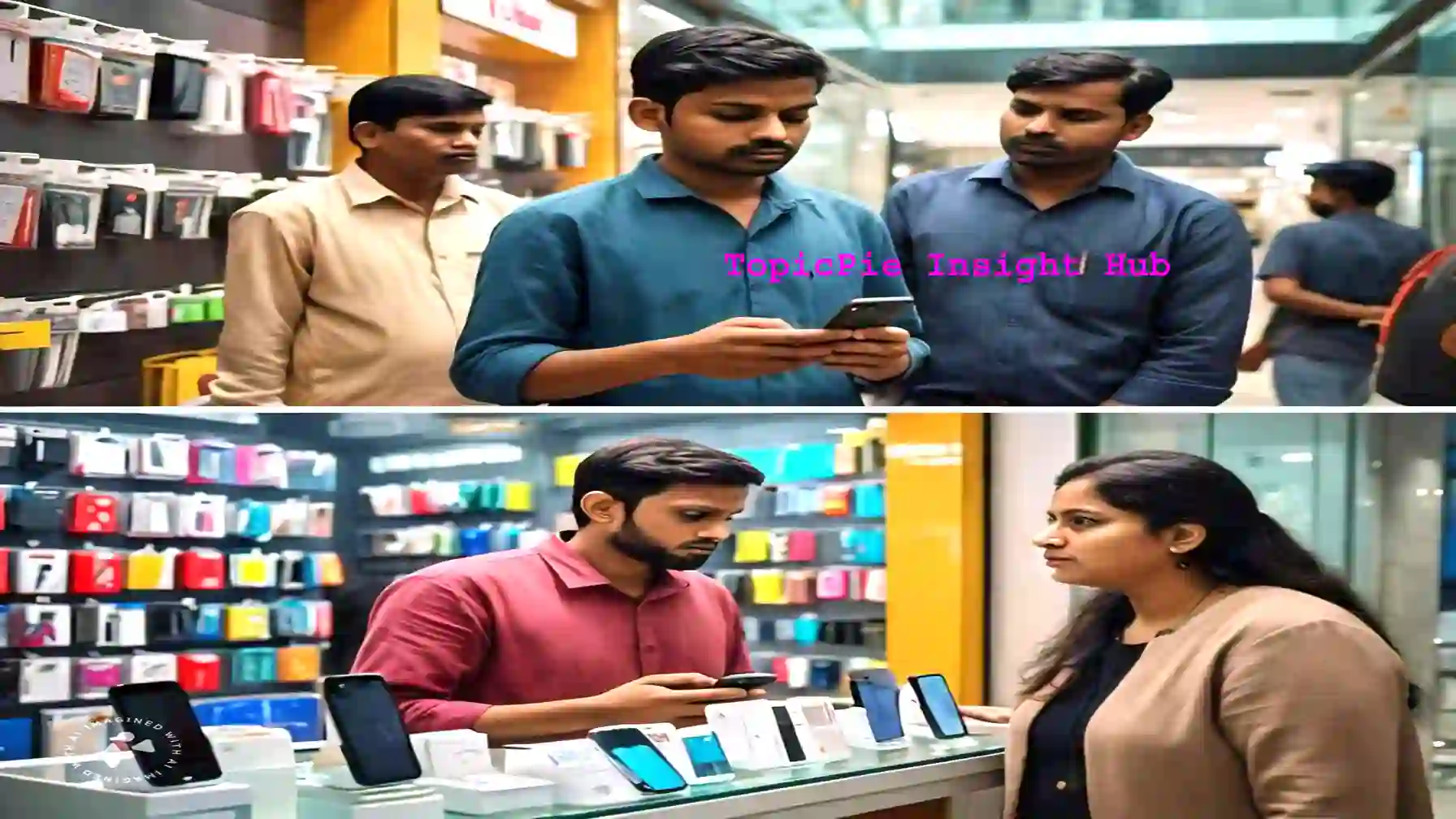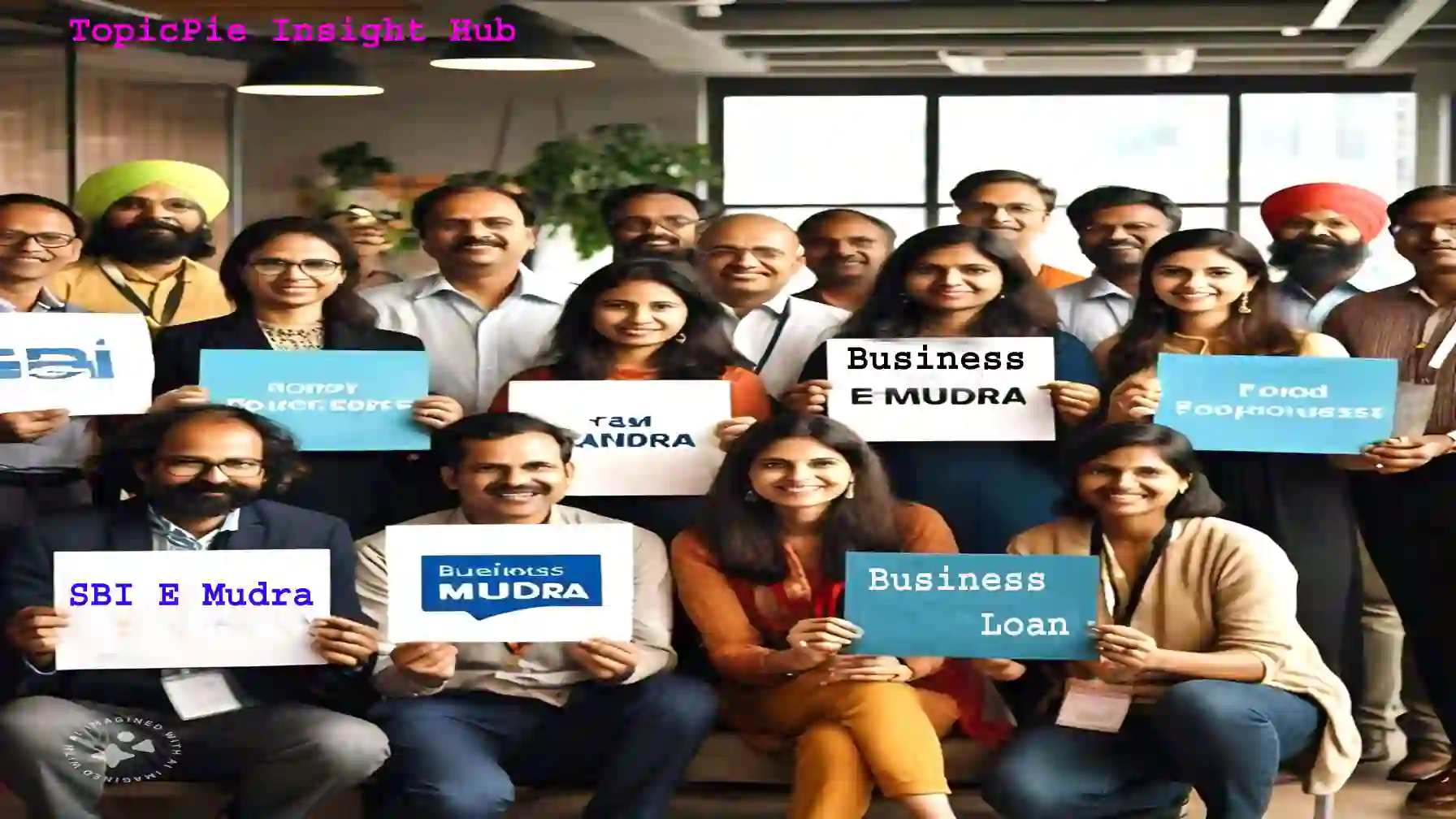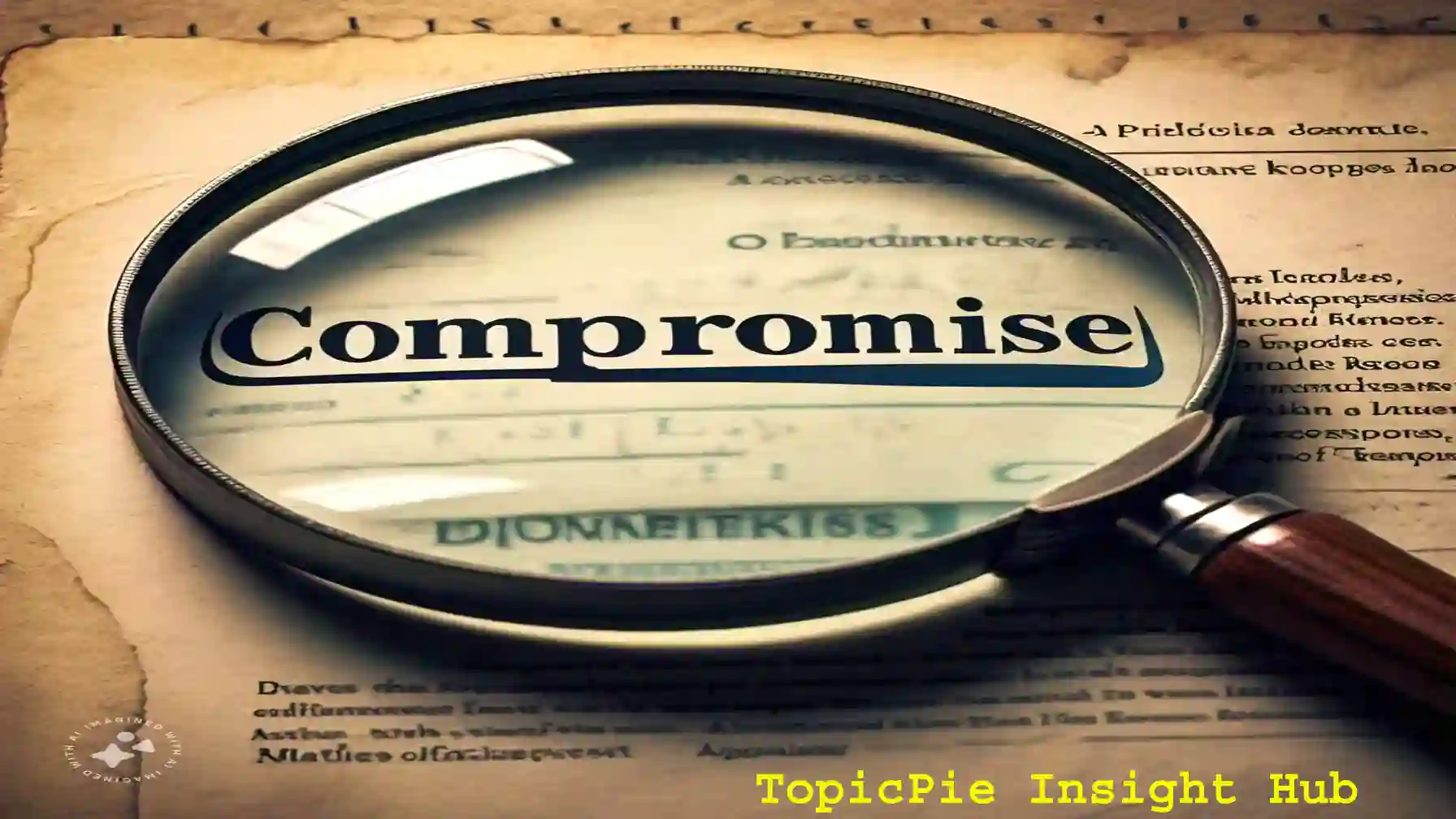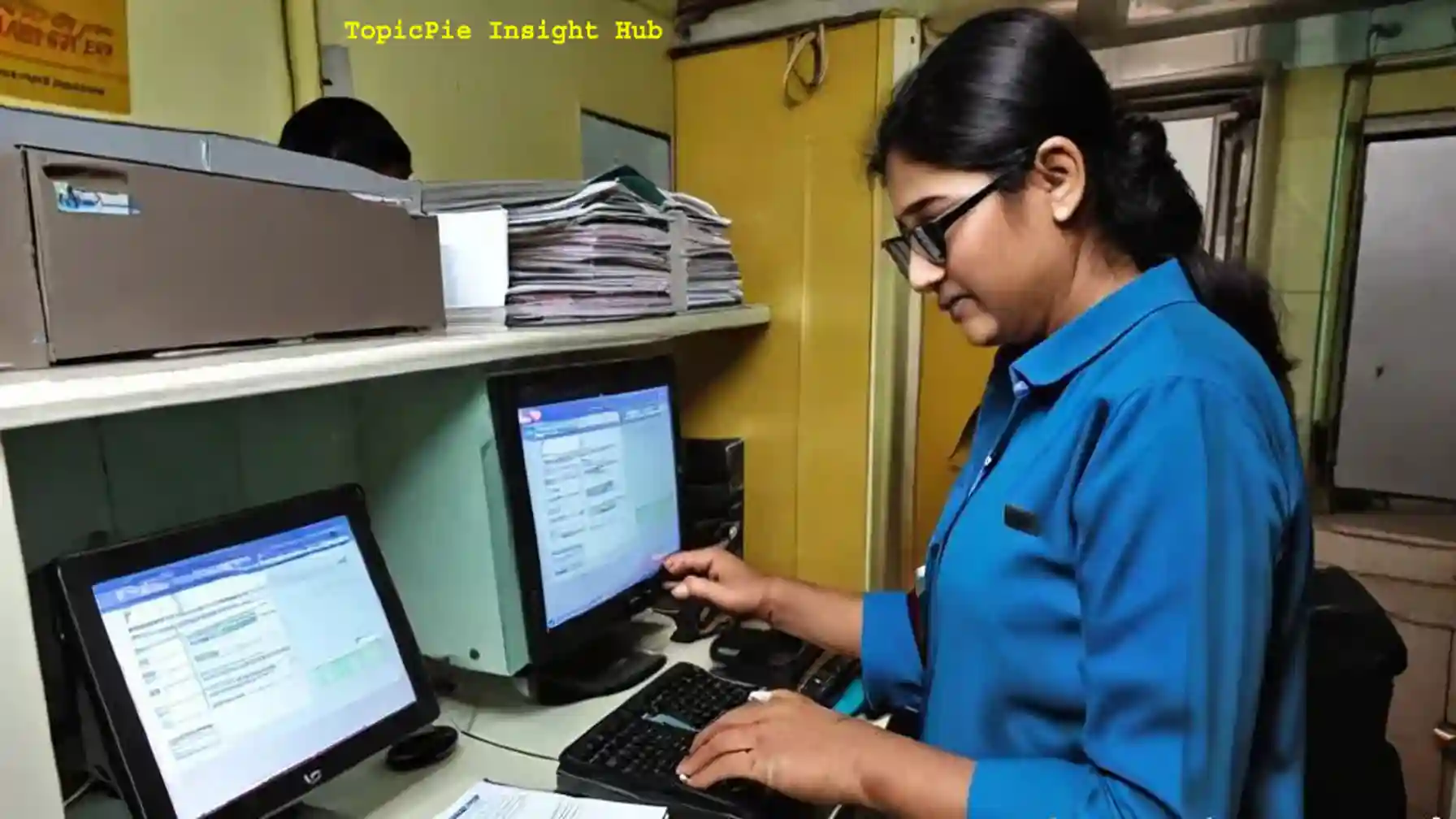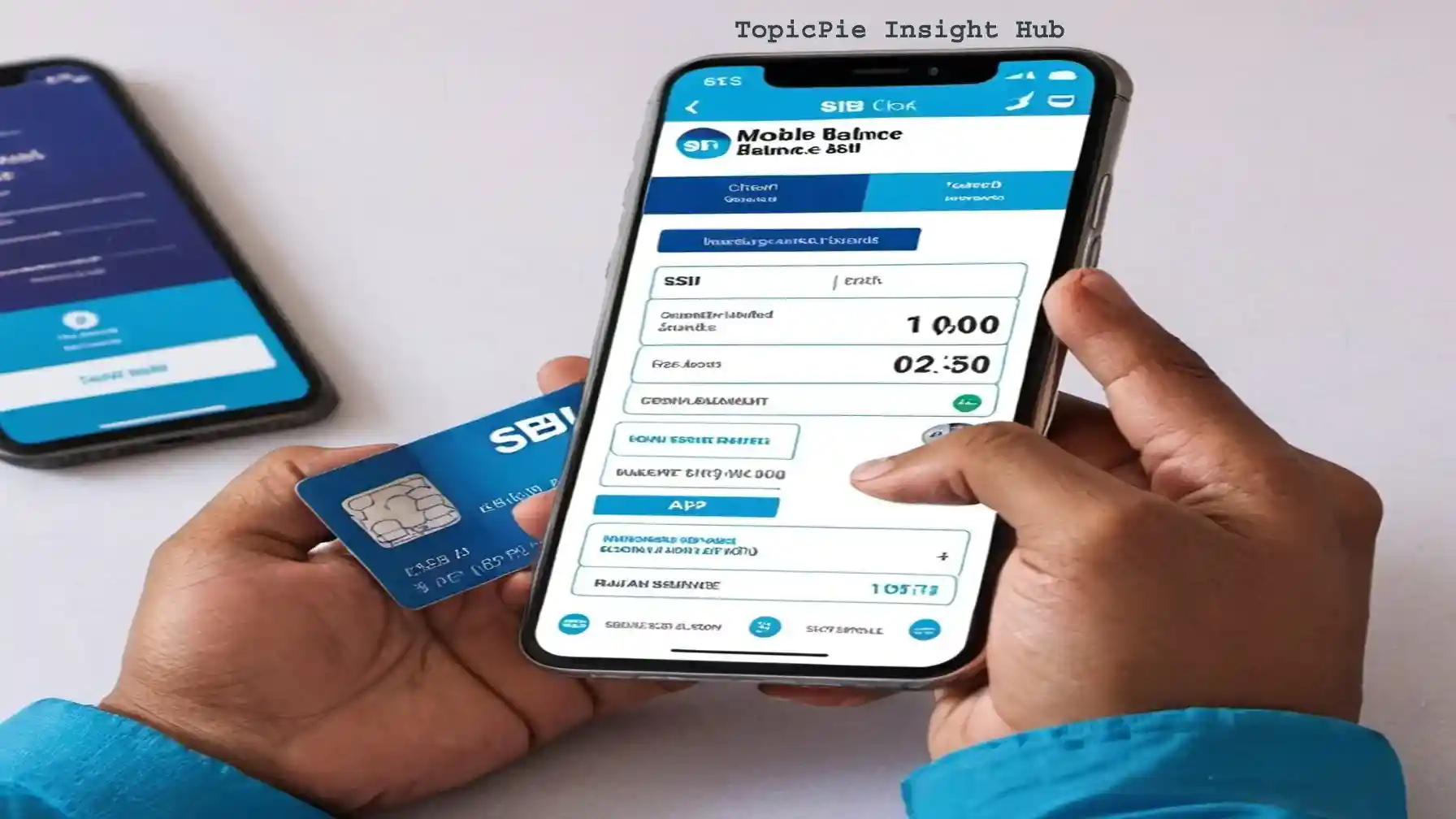Introduction:
The Pradhan Mantri Vishwakarma Scheme, often called the PM Vishwakarma Scheme, is a cornerstone of India’s commitment. It aims to preserve cultural heritage and uplift artisans’ livelihoods. This visionary initiative was launched by the Ministry of Micro, Small, and Medium Enterprises.
Overview of the PM Vishwakarma Scheme:
The PM Vishwakarma Scheme is a comprehensive initiative that provides holistic support to artisans and craftspeople across the nation. By offering them access to collateral-free credit, skill development, modern tools, incentives for digital transactions, and marketing support, the scheme empowers these unsung heroes of India’s cultural tapestry.
Importance of Artisans and Craftspeople
Artisans and craftspeople are the custodians of India’s rich and diverse cultural heritage. Their intricate craftsmanship, passed down through generations, is a testament to the country’s artistic brilliance. They create exquisite handicrafts, intricate jewelry, and beautiful pottery, contributing not only to India’s cultural identity but also to its economy. Supporting these artisans is not just an act of preservation; it’s an investment in India’s tradition and a step toward a more inclusive and economically vibrant future. The PM Vishwakarma Scheme is a vital tool in this endeavor, offering artisans the recognition and resources they need to continue their invaluable work.
PM Vishwakarma Scheme: Empowering Artisans
The PM Vishwakarma Scheme is more than just a government program; it’s a powerful initiative aimed at empowering the unsung heroes of India – the artisans and craftspeople. Craftsmanship has been the lifeblood of Indian culture, handed down through generations. The scheme, launched by the Ministry of Micro, Small, and Medium Enterprises, recognizes the pivotal role artisans play in preserving the nation’s rich heritage while contributing to its economic fabric.
Understanding the PM Vishwakarma Scheme
At its core, the PM Vishwakarma Scheme is designed to provide holistic support to artisans and craftspeople engaged in a range of traditional trades. These include blacksmithing, goldsmithing, pottery, carpentry, and sculpting, among others. The scheme offers tangible benefits to these skilled individuals, such as skill development, access to modern tools, and support in accessing credit. Moreover, the scheme encourages them to embrace digital transactions and extends marketing support, ultimately integrating them into the formal economy.
Significance of Supporting Traditional Trades under PM Vishwakarma Scheme:
Traditional trades are the threads that weave India’s diverse cultural fabric. They are not just livelihoods; they are embodiments of artistry, heritage, and innovation. By supporting these trades, the PM Vishwakarma Scheme plays a vital role in cultural preservation. It ensures that the knowledge and skills passed down through generations continue to thrive. Furthermore, supporting these artisans also contributes significantly to the country’s economic growth. Traditional crafts form a significant part of the thriving handicrafts sector, and with the scheme’s support, these artisans can enhance their skills, increase productivity, and access new markets. In doing so, they become active participants in shaping India’s economic future while preserving its rich cultural past. The PM Vishwakarma Scheme is a testament to India’s commitment to the dual goals of tradition and progress.
Key Benefits of the PM Vishwakarma Scheme:
The Pradhan Mantri Vishwakarma Scheme is a transformative initiative that seeks to empower artisans and craftspeople in India. These skilled individuals have been the backbone of the country’s rich cultural heritage, and the scheme recognizes their pivotal role. It offers a comprehensive set of benefits that not only uplift these artisans but also contribute to preserving India’s traditional crafts and promoting economic growth.
Recognition and Identity through PM Vishwakarma Scheme:
Artisans and craftspeople often toil in obscurity, their contributions overlooked. The PM Vishwakarma Scheme provides them with recognition and identity through a PM Vishwakarma Certificate and ID Card. These credentials not only serve as proof of their skills but also grant them access to various benefits and services offered by the government and other organizations. It’s a symbolic acknowledgment of their invaluable role in preserving India’s cultural tapestry.
Skill Development Opportunities in PM Vishwakarma Scheme:
One of the scheme’s fundamental pillars is skill development. Artisans are offered the opportunity to enhance their abilities through training programs. These programs encompass basic and advanced training, covering areas such as production techniques, quality control, design and development, and marketing and business skills. Artisans who undergo these training sessions are also entitled to a stipend of ₹ 500 per day, providing them with financial support as they hone their craft.
Toolkit Incentive for Artisans:
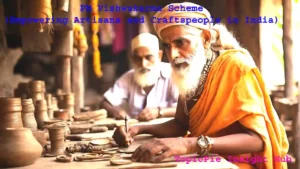
To create exceptional craft, artisans need the right tools. The scheme understands this and provides artisans with a toolkit incentive. They receive e-vouchers worth up to ₹ 15,000, enabling them to procure the necessary tools and equipment for their trade. This not only enhances the quality of their work but also boosts their productivity.
Access to Collateral-Free Credit:
Access to credit is a significant challenge for many artisans. The scheme addresses this by offering collateral-free ‘Enterprise Development Loans.’ These loans come in two tranches, with the first tranche of up to ₹ 1 lakh disbursed after basic skill training and the second tranche of up to ₹ 2 lakh provided after advanced skill training. These loans are offered at a concessional interest rate of 5% per annum, and the government provides an interest subvention of 8%. Importantly, credit guarantee fees are borne by the government, further reducing the financial burden on the artisans.
Encouraging Digital Transactions:
In a rapidly digitizing world, the scheme encourages artisans to embrace digital transactions. Artisans who register under the PM Vishwakarma Scheme are eligible for an incentive of Re 1 per transaction, for up to 100 transactions per month. This incentive promotes the use of digital payment methods such as UPI and BHIM, facilitating secure and convenient financial transactions for artisans.
Marketing Support for Artisans:
Artisans often struggle to reach wider markets and gain recognition for their work. The National Committee for Marketing (NCM) steps in to provide essential marketing support services. These services include quality certification, branding and promotion, e-commerce linkage, trade fair advertising, publicity, and various other marketing activities. The NCM also helps artisans participate in national and international trade fairs and exhibitions, opening doors to new opportunities and markets.
The Pradhan Mantri Vishwakarma Scheme is a well-rounded initiative that offers artisans and craftspeople much-needed support. It recognizes their skills, provides opportunities for growth, access to tools and credit, promotes digital transactions, and extends marketing support. Through these benefits, the scheme not only improves the lives of artisans but also contributes to the preservation of India’s cultural heritage and the growth of the handicrafts sector. It’s a win-win for the artisans, the economy, and the nation’s cultural legacy.
Eligibility Criteria for the PM Vishwakarma Scheme:
The Pradhan Mantri Vishwakarma Scheme (PM Vishwakarma) is a lifeline for artisans and craftspeople in India. While it aims to provide comprehensive support, certain eligibility criteria ensure that the scheme reaches those who need it the most.
Who Qualifies for the Scheme:
The scheme is designed to cater to artisans and craftspeople engaged in 18 specific family-based traditional trades. These trades include blacksmithing, goldsmithing, pottery, carpentry, sculpting, and more. To be eligible, one must be working with their hands and tools in the unorganized sector on a self-employment basis. This emphasis on hands-on craftsmanship reflects the scheme’s commitment to supporting those who are directly involved in preserving traditional arts.
Age Requirements:
The minimum age requirement for those seeking to benefit from the PM Vishwakarma Scheme is 18 years at the time of registration. This criterion ensures that the scheme targets adults who are actively contributing to traditional trades and are likely to benefit most from the scheme’s offerings. It acknowledges that artisans often acquire their skills over time and aims to assist them in their productive years.
Restrictions and Exclusions:
To maintain the integrity of the scheme, a set of restrictions and exclusions are in place. Beneficiaries who have availed loans under similar credit-based schemes of the Central Government or State Government for self-employment or business development in the past five years are not eligible. This restriction prevents double-dipping in government support programs.
Furthermore, the registration and benefits under the scheme are restricted to one member of a family. In this context, a ‘family’ is defined as consisting of the husband, wife, and unmarried children. This limitation ensures that a broader spectrum of families can benefit from the scheme, and it doesn’t concentrate the support in a single household.
Importantly, individuals in government service and their family members are excluded from the scheme, acknowledging that they have different avenues of support and livelihood. This exclusion helps allocate resources to those who don’t have access to similar benefits.
The eligibility criteria of the PM Vishwakarma Scheme strike a balance between inclusivity and maintaining the scheme’s integrity. It ensures that those actively engaged in traditional trades can access the benefits while preventing misuse and targeting those most in need of support.
Supported Artisan Trades:
The Pradhan Mantri Vishwakarma Scheme (PM Vishwakarma) encompasses a diverse array of traditional artisan trades, offering support and recognition to skilled individuals who have dedicated their lives to these crafts. The scheme extends its embrace to artisans engaged in the following trades:
Wood-Based Crafts: Artisans in the wood-based crafts, such as carpenters and boat makers, are essential custodians of the woodworking traditions, crafting everything from intricate furniture to boats that navigate India’s waterways.
Iron/Metal-Based and Stone-Based Trades: This category includes a wide range of skilled individuals like blacksmiths, locksmiths, and sculptors (stone carvers). They excel in working with metals and stones, producing everything from tools and utensils to exquisite sculptures and carvings.
Also Read: Yes Bank के शेयरों में और कितनी गिरावट आएगी!
Gold/Silver-Based Crafts: Goldsmiths, often referred to as Sunars, are renowned for their artistry in crafting intricate jewelry, an integral part of India’s cultural and aesthetic traditions. Their work showcases the country’s rich heritage.
Clay-Based Crafts: Potters, or Kumhaars, use their hands to shape clay into various forms, from functional pottery to decorative art. Their craft is deeply ingrained in the Indian way of life.
Leather-Based Trades: Cobblers, footwear artisans, and charmkaars, who work with leather, play a crucial role in ensuring the country’s population is well-shod. Their work combines functionality and style.
Architecture/Construction: Masons, or Raajmistris, are the cornerstone of India’s architectural marvels, building structures that stand as testaments to the country’s rich history.
Other Supported Trades: The scheme also lends its support to various other trades, including basket and mat makers, doll and toy makers, barbers, garland makers, washermen, tailors, and fishing net makers, all of whom contribute to the rich tapestry of Indian culture and daily life.
In essence, the PM Vishwakarma Scheme acknowledges and honors the artisans and craftspeople in these trades who have played an invaluable role in shaping India’s heritage and continue to do so through their craftsmanship.
How to Avail Benefits Under the PM Vishwakarma Scheme:
Availing the benefits of the Pradhan Mantri Vishwakarma Scheme (PM Vishwakarma) is a straightforward process, designed to ensure that artisans and craftspeople can easily access the support they need.
Registration Process
To begin the journey of empowerment through PM Vishwakarma, artisans and craftspeople can follow these simple steps:
- Visit the Official Portal: Start by visiting the official PM Vishwakarma Scheme portal, www.pmvishwakarma.gov.in.
- Register Online: On the website, you will find the option to register. Begin the registration process by clicking on it.
- Provide Required Information: During registration, you will be asked to provide necessary information, including your Aadhaar number, Aadhaar linked mobile number, bank details, and ration card. If you do not have a ration card, you can use Aadhaar cards of all family members (as defined in the guidelines).
- Bank Account: If you don’t have a bank account, don’t worry. The Common Service Centers (CSC) will guide you through the process of opening one.
Document Submission: Ensure that you provide all the required documents, as specified by the Ministry of Micro, Small, and Medium Enterprises (MoMSME).
Required Documentation:
For registration, you will need to provide the following documents or information:
- Aadhaar: Your Aadhaar card is a primary identification document.
- Mobile Number: Aadhaar linked mobile number to receive communications and updates.
- Bank Details: Bank account information for financial transactions.
- Ration Card: Mandatory for registration. In case you don’t have one, Aadhaar cards of all family members can be used.
- PAN Card (Optional)
The registration process is designed to be inclusive and accessible, ensuring that artisans and craftspeople can easily avail themselves of the scheme’s benefits. It’s a crucial step towards supporting their skills and livelihoods while preserving India’s cultural heritage.
Credit Support and Loans in PM Vishwakarma Scheme:
The Pradhan Mantri Vishwakarma Scheme (PM Vishwakarma) recognizes that access to credit is a critical component of empowering artisans and craftspeople. To facilitate their economic growth and business expansion, the scheme provides credit support in the form of collateral-free loans. Here’s a closer look at this essential aspect of the scheme:
Collateral-Free Loans for Artisans
One of the standout features of the PM Vishwakarma Scheme is the provision of collateral-free ‘Enterprise Development Loans’ for artisans. These loans are a lifeline for artisans who often lack the collateral or assets typically required to secure conventional loans. Under the scheme, artisans can access two tranches of loans:
- First Tranche: Artisans are eligible for a loan of up to Rs. 1 lakh, repayable over 18 months. This initial loan tranche aims to provide a financial boost to artisans to kickstart or expand their businesses.
Second Tranche: After artisans undergo advanced skill training, they can access the second loan tranche of up to Rs. 2 lakh, with a longer repayment period of 30 months. This phase of credit support enables artisans to further scale their operations.
Interest Rates and Subvention
The PM Vishwakarma Scheme offers credit at a concessional rate of interest, set at 5% per annum. This reduced interest rate eases the financial burden on artisans, making credit more affordable. However, what makes these loans even more attractive is the interest subvention provided by the Government of India. The government covers up to 8% of the interest, ensuring that artisans pay only a nominal interest rate of 5%.
Credit Guarantee Coverage
In a move that further bolsters the financial security of artisans, the loans sanctioned and disbursed under the PM Vishwakarma Scheme are eligible for credit guarantee coverage. This means that artisans do not need to provide collateral or guarantors to access these loans. The credit guarantee coverage is borne by the government, offering peace of mind to artisans who might otherwise struggle to meet conventional lending requirements.
In summary, the credit support and collateral-free loans offered under the PM Vishwakarma Scheme are a game-changer for artisans and craftspeople. These loans provide the necessary financial backing to enhance their businesses and livelihoods. With favorable interest rates, interest subvention, and credit guarantee coverage, artisans can access credit with confidence, enabling them to thrive in their traditional trades.
Skill Development and Training
The Pradhan Mantri Vishwakarma Scheme (PM Vishwakarma) recognizes the pivotal role of skill development and training in empowering artisans and craftspeople. It offers a structured approach to enhance their skills and expertise, providing a solid foundation for success in traditional trades.
Skill Verification and Basic Training:
The journey of skill development within the PM Vishwakarma Scheme begins with a two-fold approach: Skill Verification and Basic Training. Now, let’s dive deeper into these essential elements:
Skill Verification: Artisans seeking support under the scheme undergo a skill verification process. This step ensures that artisans indeed possess the traditional skills they claim to have. The verification process validates their existing skills and identifies areas for improvement.
Basic Training: Following skill verification, artisans have the opportunity to participate in a 5-7 day (40 hours) Basic Training program. This program covers a range of essential topics, including production techniques, quality control, design and development, and even marketing and business skills. It equips artisans with the knowledge and tools needed to enhance their traditional trades.
Optional Advanced Training
While the Basic Training program provides a strong foundation, the PM Vishwakarma Scheme goes a step further by offering an optional Advanced Training program. This program extends for 15 days (120 hours) and delves deeper into honing the artisans’ skills and expertise. It offers advanced insights into the intricacies of their crafts, further improving their proficiency.
Training Stipend Details:
To ensure that artisans can focus on their training without concerns about their livelihood, the scheme provides a stipend during the training period. Artisans who participate in both Basic and Advanced Training are eligible to receive a stipend of Rs. 500 per day. This stipend serves as a financial support mechanism, recognizing the artisans’ commitment to enhancing their skills.
The PM Vishwakarma Scheme’s emphasis on skill development and training underscores its commitment to preserving and uplifting traditional trades. By offering both Basic and Advanced Training, along with stipends, artisans are empowered to refine their skills, increase their productivity, and secure a better future in their respective crafts.
PM Vishwakarma Scheme: Toolkit Incentive and Digital Transactions
The Pradhan Mantri Vishwakarma Scheme (PM Vishwakarma) recognizes the importance of equipping artisans with the tools they need to excel in their traditional trades. It provides a toolkit incentive and encourages the use of digital transactions, ushering artisans into the digital age.
Toolkit Incentive for Artisans:
Artisans, often working with traditional tools, require a set of instruments and equipment to enhance their productivity and product quality. To support this, the PM Vishwakarma Scheme offers a toolkit incentive of up to ₹ 15,000 in the form of e-vouchers. These e-vouchers can be redeemed to purchase tools and equipment essential for their specific trade. This incentive not only empowers artisans but also ensures that they have access to modern tools that can significantly boost their efficiency and the quality of their craft.
Encouraging Digital Payments:
In a bid to align artisans with the digital revolution, the PM Vishwakarma Scheme incentivizes the use of digital transactions. Artisans registered under the scheme are eligible for an incentive of Rs. 1 per digital transaction, with a maximum cap of 100 transactions per month. This encouragement to embrace digital payment methods, such as UPI and BHIM, not only simplifies financial transactions but also promotes financial inclusion and transparency within the artisan community.
The toolkit incentive and promotion of digital transactions represent a forward-looking approach within the PM Vishwakarma Scheme. By providing tools and fostering digital payment adoption, the scheme not only honors tradition but also prepares artisans for a technologically driven future, ensuring their sustainability and success.
Marketing Support and Recognition:
The Pradhan Mantri Vishwakarma Scheme (PM Vishwakarma) goes beyond skill development and financial assistance; it recognizes the importance of marketing support and recognition for artisans and craftspeople. This facet of the scheme aims to amplify their reach and visibility in the market.
Quality Certification and Branding:
One of the key components of the PM Vishwakarma Scheme is the provision of quality certification and branding support. Artisans and their products can benefit from certification that attests to the quality and authenticity of their craft. Quality certifications instill trust among customers and enhance the marketability of their products. Furthermore, branding assistance ensures that artisans can create a unique and identifiable brand for their products. This branding not only adds value to their creations but also sets them apart in a competitive market.
E-commerce Linkage and Trade Fair Participation:
In the modern marketplace, having an online presence is vital for reaching a broader customer base. The PM Vishwakarma Scheme acknowledges this by offering e-commerce linkage support. Artisans can connect with online marketplaces and expand their reach beyond local markets. Additionally, the scheme encourages artisans to participate in trade fairs, exhibitions, and other marketing activities. These events provide exposure to a wider audience and open doors to opportunities for increased sales and collaborations.
The marketing support and recognition provided by the PM Vishwakarma Scheme are game changers for artisans. They not only help preserve the traditional trades but also enable artisans to thrive in a competitive market. Quality certification, branding, e-commerce linkage, and trade fair participation are key drivers in positioning artisans for success and sustainability.
Preserving Cultural Heritage through PM Vishwakarma Scheme:
One of the core objectives of the Pradhan Mantri Vishwakarma Scheme (PM Vishwakarma) is to safeguard and promote India’s rich cultural heritage. Artisans, with their mastery of traditional trades, play an indispensable role in preserving this invaluable legacy.
The Role of Artisans in Cultural Preservation:
Artisans are the custodians of time-honored crafts and skills that have been passed down through generations. Their work encompasses a myriad of traditional art forms, from intricate woodwork and pottery to exquisite jewelry-making and intricate weaving. By supporting artisans, the PM Vishwakarma Scheme acknowledges their role as cultural torchbearers.
Artisans breathe life into cultural traditions, ensuring that age-old crafts and techniques endure. They create tangible expressions of culture, infusing every piece with the essence of heritage. As artisans flourish and their crafts thrive, India’s cultural diversity and artistic legacy remain vibrant and continue to captivate the world.
The PM Vishwakarma Scheme, by empowering artisans and acknowledging their contribution to cultural preservation, not only sustains traditions but also fosters a sense of national pride in India’s artistic heritage.
Economic Impact of the PM Vishwakarma Scheme:
The Pradhan Mantri Vishwakarma Scheme (PM Vishwakarma) is not just about preserving traditional crafts; it’s a powerful catalyst for economic growth. This scheme’s economic impact is multifaceted, with a substantial focus on job creation and overall economic development.
Job Creation under PM Vishwakarma Scheme:
One of the most significant contributions of the PM Vishwakarma Scheme is job creation. India’s artisan community is vast, and by investing in their skills and businesses, the scheme generates new employment opportunities. Artisans, who were once struggling to make ends meet, can now not only sustain themselves but also hire additional help as their businesses grow. The scheme provides a much-needed boost to employment in rural and semi-urban areas, where these traditional trades are prevalent.
Economic Growth through PM Vishwakarma Scheme:
The economic growth spurred by the PM Vishwakarma Scheme is not limited to job creation alone. Artisans, armed with improved skills, modern tools, and marketing support, witness increased production and higher quality output. This translates into higher income levels. As their businesses expand and thrive, artisans contribute to local and regional economies by generating higher sales and revenue.
Moreover, the scheme fosters entrepreneurship. With access to collateral-free credit, artisans can scale up their operations, invest in new equipment, and explore new markets. This entrepreneurial spirit leads to the creation of micro-enterprises and small businesses, further stimulating economic growth.
The economic impact also ripples through related industries. Suppliers of raw materials and tools, transportation services, and marketing platforms benefit from increased demand. The PM Vishwakarma Scheme not only empowers artisans but also acts as a catalyst for the growth of the entire value chain within the traditional crafts sector.
The PM Vishwakarma Scheme serves as an engine of economic growth. By creating jobs, boosting artisan incomes, and fostering entrepreneurship, it not only transforms the lives of artisans but also invigorates local and regional economies. This holistic approach to economic development not only preserves India’s cultural heritage but also propels it into a more prosperous future.
FAQs About the PM Vishwakarma Scheme:
The Pradhan Mantri Vishwakarma Scheme (PM Vishwakarma) is a comprehensive initiative to empower artisans and craftspeople. Here are some commonly asked questions and detailed answers to help you better understand the scheme:
1. What is the Pradhan Mantri Vishwakarma Scheme?
PM Vishwakarma is a government initiative that offers support to artisans and craftspeople through credit, skill development, tool incentives, and marketing assistance.
2. Who qualifies as the Scheme’s intended beneficiary?
Artisans engaged in 18 traditional trades are eligible.
3. What are the key components of PM Vishwakarma?
The scheme offers recognition, skill development, toolkit incentives, credit support, incentives for digital transactions, and marketing support.
4. What criteria must one meet to be eligible for the Scheme?
To qualify, artisans must be engaged in one of the eligible trades, be at least 18 years old, not have availed loans from similar schemes in the past 5 years, and belong to a family (defined as husband, wife, and unmarried children).
5. How can artisans avail benefits under the Scheme?
They can register on the official PM Vishwakarma website and provide essential documents like Aadhaar, mobile number, bank details, and ration card (or Aadhaar cards for family members).
Also Read: National Unity Day: Celebrating India’s Diversity and Unity
6. What lending institutions can provide credit under the Scheme?
Scheduled Commercial Banks, Regional Rural Banks, Small Finance Banks, Cooperative Banks, Non-Banking Finance Companies, and Micro Finance Institutions can lend under the scheme.
7. Is collateral required for loans under the scheme?
No, collateral security is not required.
8. What is the interest rate and amount of interest subvention?
The interest rate is 5%, with an 8% interest subvention provided by the government.
9. Are all loans eligible for guarantee coverage?
Yes, all loans sanctioned and disbursed under the scheme are eligible for guarantee coverage.
10. Is there a penalty for early loan repayment?
No prepayment penalty is charged after 6 months of loan disbursement.
These FAQs shed light on the PM Vishwakarma Scheme, ensuring that artisans and craftspeople can navigate the program effectively and leverage its benefits to enhance their skills and businesses.
Opting for a Better Future for Artisans:
The Pradhan Mantri Vishwakarma Scheme (PM Vishwakarma) isn’t just a government initiative; it’s a lifeline for artisans and craftspeople across India. It represents a pivotal moment in the lives of these skilled individuals, offering them the opportunity to step into a brighter, more secure future.
Encouraging Artisans to Benefit from the Scheme:
Artisans, the custodians of traditional trades, have faced numerous challenges over the years. Economic uncertainties, dwindling demand for traditional crafts, and limited access to resources have often overshadowed their remarkable skills. PM Vishwakarma, however, presents a ray of hope.
The scheme encourages artisans to embrace this opportunity for a better future. By providing recognition, skill development, tool incentives, credit support, digital transaction benefits, and marketing assistance, it offers a comprehensive platform for their growth. Artisans can now aspire to improve their skills, expand their businesses, access credit without collateral, and transition into the digital era. It’s a chance to preserve their heritage and provide a stable livelihood for their families.
PM Vishwakarma is more than a scheme; it’s an avenue to empower artisans and elevate traditional crafts. By opting for this better future, artisans can revitalize their trades and ensure that these time-honored skills endure, enriching the cultural fabric of India and securing their place in an ever-evolving world. It’s a choice that holds the promise of a brighter tomorrow.
Conclusion:
The Pradhan Mantri Vishwakarma Scheme (PM Vishwakarma) stands as a testament to the Indian government’s commitment to preserving its cultural heritage and empowering artisans. As we conclude our exploration of this visionary initiative, it’s essential to recap the scheme’s benefits and its profound impact.
PM Vishwakarma offers recognition, skill development, tool incentives, credit support, digital transaction incentives, and marketing assistance to artisans. These facets not only improve their skills but also open doors to new markets, financial stability, and business growth. Furthermore, the scheme reiterates the importance of artisans in preserving India’s rich cultural heritage.
The impact of PM Vishwakarma reaches far beyond the individual artisan. It sparks job creation, drives economic growth, and nurtures entrepreneurship. The scheme breathes new life into traditional crafts and ensures that they continue to flourish, enriching India’s cultural tapestry and contributing to its economic prosperity.
In essence, PM Vishwakarma is more than a scheme; it’s a celebration of artistry, culture, and economic vitality. It paves the way for a brighter future for artisans and a more vibrant, prosperous India.
